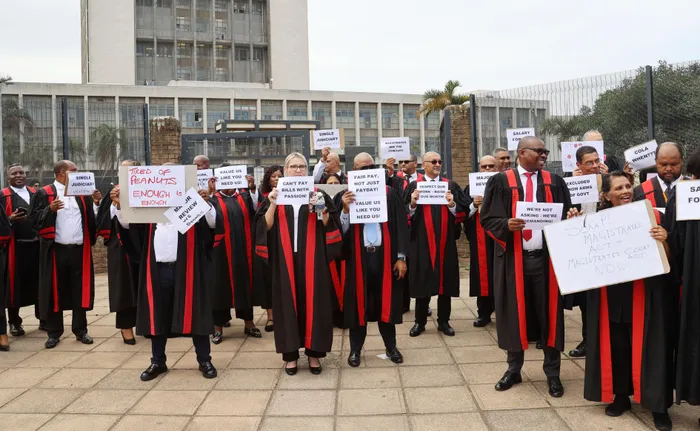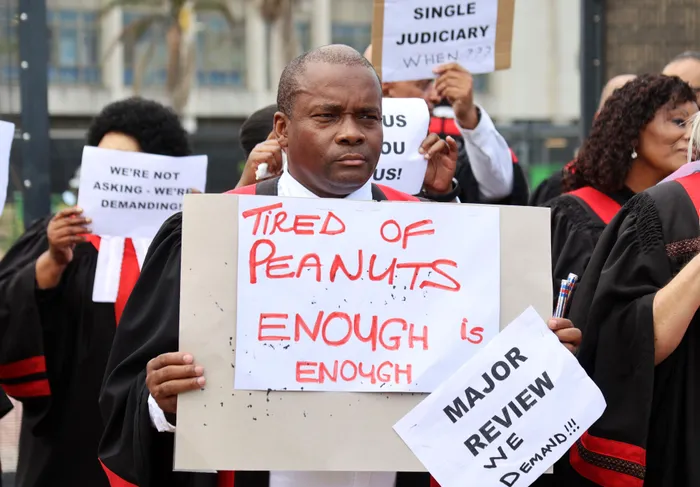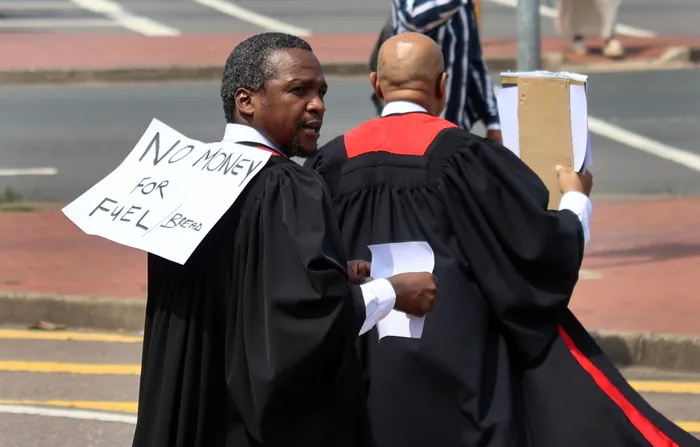
Judicial officers take a stand: Advocating for better pay and recognition in the South African judicial system.
Image: Tumi Pakkies/ Independent Newspapers
MAGISTRATES ‘swapped’ the bench for picket lines in Durban to demonstrate against what they describe as systematic discrimination and structural exclusion within the judiciary
Magistrate Scelo Zuma, representing the Judicial Officers’ Association of South Africa (Joasa) president, stated that their historical concerns have been ignored.
He said they went as far as trying to litigate the issues. However, litigation has also proven futile and they have decided to pursue a different course of action to address their concerns.
“There is an outstanding, long-standing issue relating to our salaries. Annually, there are reports which are prepared, and recommendations are then made to the president and the (Judicial Service) Commission,” Zuma said.

Magistrates unite in Durban, demanding fair remuneration and judicial independence.
Image: Tumi Pakkies/ Independent Newspapers
He said the recommendations have never been implemented.
“This is happening annually. We have tried to litigate. However, our calls and cries are not heeded,” Zuma said.
“Another issue that we are seeking to be addressed is the issue of a single judiciary because, seemingly, it would appear that magistrates are existing on the periphery of the judicial structure. Whereas the constitution advocates for a single judiciary.”
Zuma noted significant recommendations for improved magistrate salaries and benefits, highlighting a disparity with judges’ benefits.

A plea for fairness: South African magistrates demonstrate for better working conditions and salaries.
Image: Tumi Pakkies/ Independent Newspapers
He said they do not have medical aid, housing allowances or vehicle allowances.
“We are planning to have similar actions rolled out throughout the country, until such time that the powers that be attend to this issue because it is a dire situation. It is something that, unfortunately, we cannot let go of. It has to be addressed,” Zuma said.
Magistrate Dr Betty Rauheath said the last time they got a real increase was in 2007.
Rauheath has been in criminal justice for 48 years.
“I’m now 70 and I have to leave, but I feel sad that I have to leave without having seen any changes,” Rauheath said.
Magistrate Mondli Nhlangulela, who has been a magistrate for about seven years, said their salaries are depleted once they pay for their homes and vehicles.
He said if they can be given housing allowance, car allowance and a petrol card, they will be able to breathe.
“Our safety is always compromised. Our work is such that you don’t know if and when you’ve offended someone,” Nhlangulela said.
“They must pay us our dues, because there have been about three reports (on the issue of the payment structure), but none have been implemented. (We are not asking) to be on par with the judges, but put us closer, because the gap is too much.”
Advocate Francois Botes SC said the Magistrates Commission deals with the manner in which magistrates function, operate, are appointed, and also remuneration issues.
“If a magistrate is dissatisfied with working conditions, with remuneration, that’s something that needs to be referred to the Magistrates Commission, and if all of that fails, well, then a court application must be initiated to the High Court,” Botes said.
He stated that industrial action would not be particularly beneficial for the magistrates.
“If they try to engage and it wasn’t addressed, once again, I think they should pursue a higher court. And then an application needs to be initiated in the High Court to address the concerns properly,” Botes said.
Cape Times